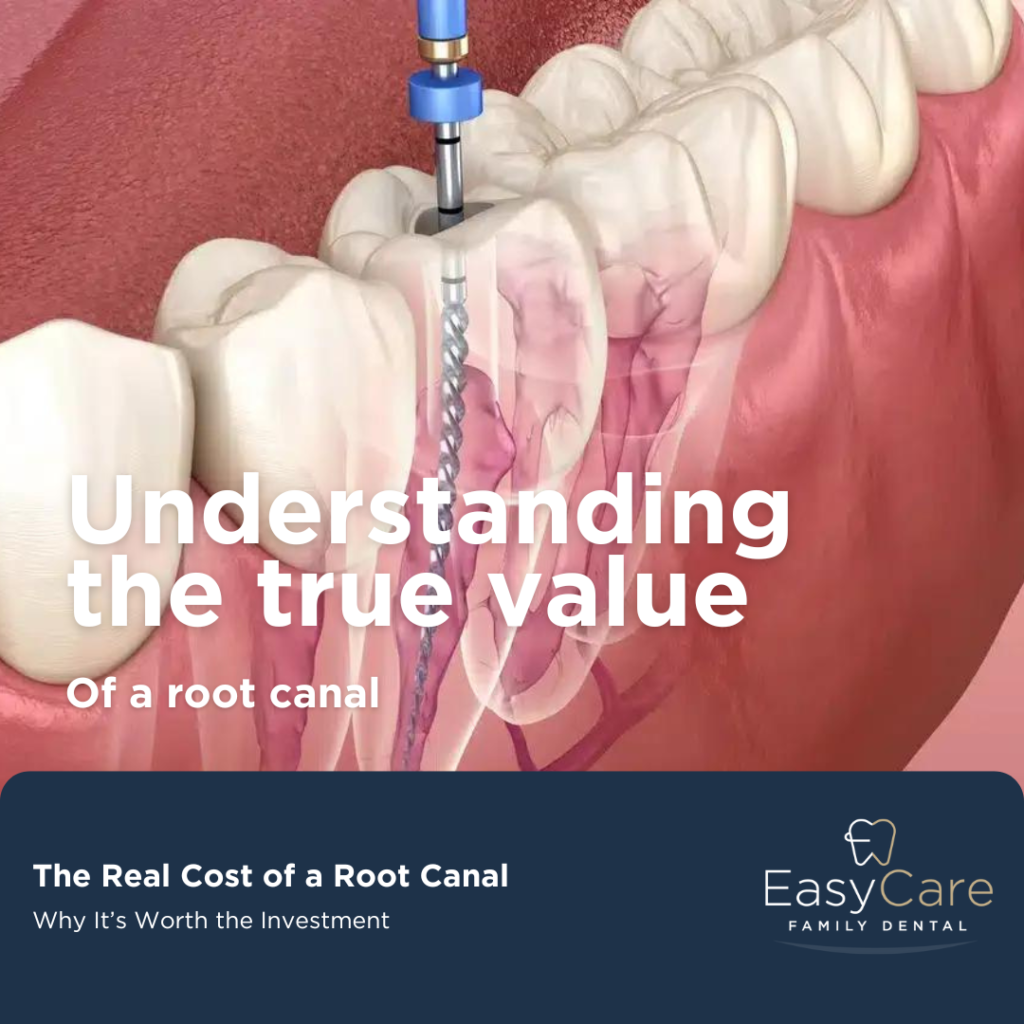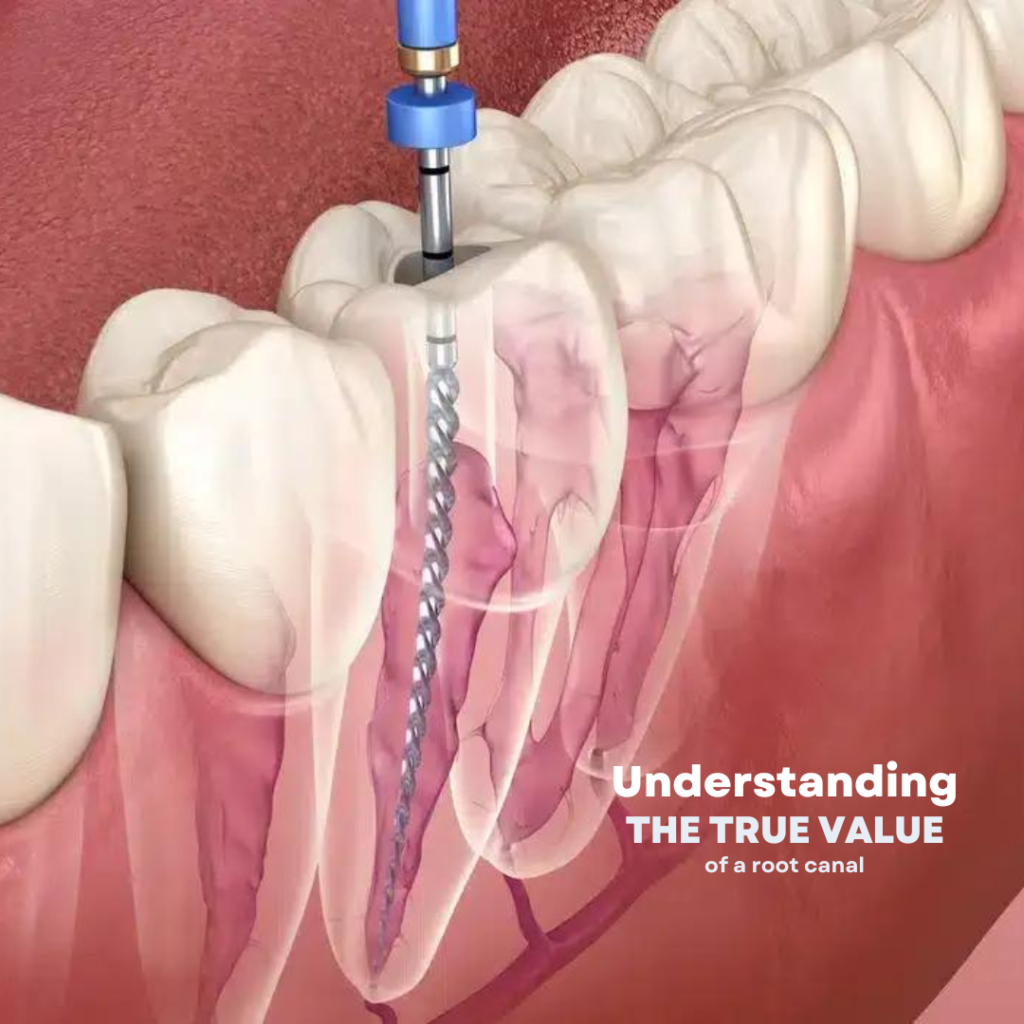The Real Cost of a Root Canal: Why It’s Worth the Investment
You know that sinking feeling when your dentist says you need a root canal? Your first thoughts likely turn to potential pain, inconvenience…and how much this procedure will put a dent in your wallet. Root canals don’t exactly have the best reputation when it comes to affordable dental care.
But before you go into panic mode, let’s take a look at what’s really involved in a root canal and why this treatment to save your natural tooth carries a bigger price tag. Understanding the “why” behind the cost can make it a little easier to stomach.
A Root Canal 101 Crash Course
Deep inside each tooth, there’s an inner chamber called the pulp, which contains nerves and blood vessels. When this pulp becomes infected or inflamed due to deep decay, repeated dental work, cracks, or trauma, it can lead to intense pain, swelling, abscess, and even bone loss around the tooth if left untreated.
The root canal procedure is essentially a way to remove the diseased pulp tissue while leaving the outer tooth and roots intact. As a general dentist, I have the training and specialized tools to meticulously clean out the inner pulp chamber and root canals, disinfect the area, and seal it off with a rubber-like material. The tooth is then capped with a crown to reinforce its strength and structure.
It may sound intense, but root canals are designed to save your natural tooth rather than losing it completely – and they’re effective at relieving the pain and preventing more serious problems. Now to address the cost factor…
Why Root Canals Tend to Be Pricier Than Other Dental Work
There are a few key reasons this procedure commands a higher fee than many other common dental treatments:
- It’s labor-intensive and complex. Using specialized tools and techniques, I have to meticulously and carefully clean out all of the infected pulp tissue from the inner tooth – an intricate process often requiring a dental operating microscope and multiple visits.
- It’s an investment in preserving your natural tooth. While root canals have higher upfront costs, they’re still cheaper in the long run than extracting and replacing the tooth with an implant or bridge—not to mention the advantages of keeping your real tooth.
- Fancy equipment and supplies add up. From dental operating microscopes to digital X-ray machines and specialized root canal filling materials, a lot goes into making the procedure safe, comfortable, and long-lasting – but equipment isn’t exactly cheap.
Understanding Materials Used in Root Canal Treatment
Root canal treatment is a crucial procedure aimed at saving a tooth that is severely infected or damaged. The success of a root canal treatment largely depends on the materials used during the procedure. In this blog, we’ll explore the different materials involved in root canal treatments and explain why we specifically use BC Sealer and Dentsply Gutta-Percha (GP).
Key Materials Used in Root Canal Treatment
- Endodontic Files
- Purpose: These are used to clean and shape the root canals by removing infected pulp and debris.
- Types: Stainless steel and nickel-titanium files are commonly used, with nickel-titanium offering greater flexibility and efficiency.
- Irrigants
- Purpose: Irrigating solutions are used to disinfect the root canals and remove debris.
- Common Irrigants: Sodium hypochlorite, EDTA, and chlorhexidine.
- Sealants
- Purpose: Root canal sealers fill the space around the root canal filling material to ensure a complete seal, preventing bacteria from re-entering the canal.
- Types: Epoxy resin-based, calcium hydroxide-based, glass ionomer-based, and bioceramic-based sealers.
- Root Canal Filling Materials
- Purpose: These materials fill the cleaned and shaped root canals, providing a hermetic seal to prevent reinfection.
- Common Materials: Gutta-percha, resilon, and often MTA.
Why We Use BC Sealer and Dentsply Gutta-Percha
In our practice, we use BC Sealer and Dentsply Gutta-Percha for root canal treatments. Here’s why these materials are our preferred choices:
BC Sealer
Bioceramic Sealer: BC Sealer is a bioceramic-based root canal sealer known for its superior properties.
- Biocompatibility: BC Sealer is highly biocompatible, which means it is well-tolerated by the body’s tissues. This reduces the risk of adverse reactions and promotes healing.
- Excellent Sealing Ability: BC Sealer has outstanding sealing properties, ensuring that the root canal is thoroughly sealed to prevent bacterial leakage.
- Hydrophilic Properties: The hydrophilic nature of BC Sealer allows it to bond well with the moist dentinal walls, creating a better seal and enhancing the overall success rate of the root canal treatment.
- Antimicrobial Properties: BC Sealer possesses intrinsic antimicrobial properties, which help in eliminating any remaining bacteria within the root canal system.
Dentsply Gutta-Percha
Gutta-Percha Points: Gutta-percha is a widely used root canal filling material due to its favorable properties.
- Proven Track Record: Dentsply Gutta-Percha has been used for decades in endodontics, with a long history of successful clinical outcomes.
- Thermoplasticity: Gutta-percha is thermoplastic, meaning it can be softened by heat and then compacted to adapt perfectly to the shape of the root canal.
- Biocompatibility: Like BC Sealer, gutta-percha is biocompatible, reducing the risk of adverse tissue reactions and promoting healing.
- Versatility: Gutta-percha can be used with various techniques, including lateral condensation, warm vertical condensation, and carrier-based obturation systems, making it a versatile choice for different clinical scenarios.
The materials used in root canal treatment play a pivotal role in ensuring the procedure’s success and the long-term health of the tooth. By using BC Sealer and Dentsply Gutta-Percha, we leverage their superior sealing abilities, biocompatibility, and proven clinical effectiveness to provide our patients with the best possible outcomes.
The Bottom Line on Root Canal Costs
While root canals aren’t a trivial expense, they’re still your best bet for saving an infected natural tooth and avoiding more costly and invasive procedures like extractions and implants down the road. When you invest in a root canal, you’re investing in preserving your dental health and your smile in the most effective, affordable way possible. Be sure to discuss pricing with us upfront, explore potential payment plan options, but don’t avoid treatment just because of the cost factor – putting off a necessary root canal can lead to even higher expenses and more extensive dental work in the long run.
If you’re considering a root canal and want to learn more about its suitability for your needs, schedule a consultation with us. We’ll provide personalized advice and a detailed treatment plan to help you achieve the smile you deserve.
References:
- Journal of Endodontics: Study on biocompatibility of bioceramic sealers.
- Clinical evaluations and patient satisfaction reports.
- Studies on the effectiveness and reliability of gutta-percha.
- Research on the antimicrobial properties of bioceramic sealers.
For more information on root canal treatment, please CLICK HERE





